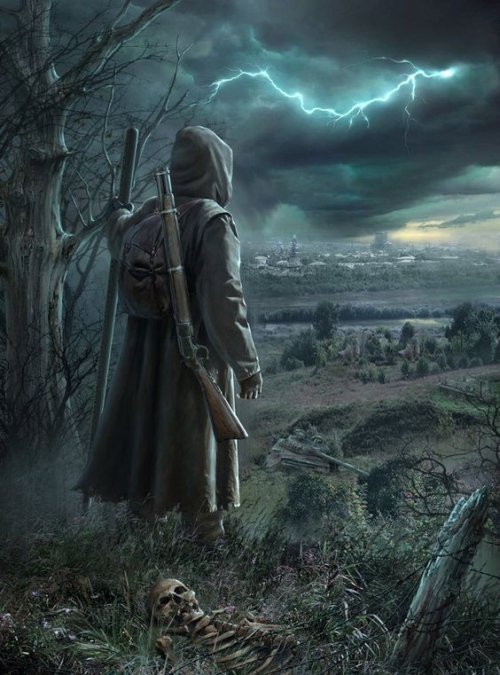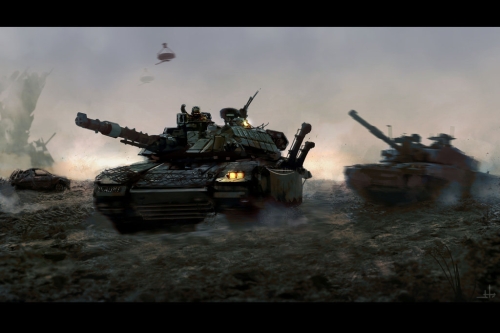KEEP IN MIND: Traits are the total sum amount of special skills, unique equipment, and powerful genetic alterations your character has obtained in their lifetime. To start with, you have twelve points you can create traits with. You will gain more points over time as the role play progresses. You get to create your own traits and fit them in each class, depending on what you're using them for! As a quick summary of each...
Grunts use their training and experience as soldiers and survivalists, and tinker with weapons and armour to improve their capabilities.
Listeners use mutagenic properties in their DNA to “code” new biological mutations for themselves.
Pilots use vehicles, drones, and advanced technology to try and grant themselves an edge over opponents.
Grunts and Pilots do have a small measure of overlap concerning technology, in that they both use it to try and improve themselves. As a rule of thumb though, Pilots use and have domain over all technology, whereas Grunts only use and have domain over technology strictly related to their weapons and armour, and not much beyond it.
Classes are referred to in-universe. People do actually refer to each other as grunts, listeners, and pilots from time to time, if their talents are self-evident in some way. It can affect the relationship between various factions as well, for example: U-ARM distrusts Listeners, whereas the Children of Eve are quite compassionate toward them. To learn more about each of the classes (Grunts, Listeners, and Pilots), scroll down and read the full sections about them!
You can (and likely with some traits, should) spend multiple points on it to make it more effective. While there is no precise measurement of how strong they are (because NPC's play by different rules than PC's do), the number of points you spend in your equipment and skills and powers does help determine how common it is. Commonality measures how often others achieve the same level of general competency in something as you, or how often their equipment meets the same level of standards as yours, or how often their mutant powers reach the same level of power as you possess.
Beyond this, remember: Every decision you make will have consequences, sometimes dire, for both your characters and the world in which they live. This includes the traits on their character sheet. Don't be too reckless!
Grunts - In Detail

Grunts are by and far the most common and typically underrated among the three classes. They specialize in survival, sharpshooting, and adapting to their environment however it most suits them. When one thinks of a soldier, or any other trained infantry combatant, they're thinking of Grunts. When one thinks of battlefield medics applying nanomachines to mend a person's injuries, they're thinking of Grunts. When one wishes to be trained in the skills necessary to knock someone around in CQC, they are thinking of Grunts.
When taking skills as a Grunt, consider them as human as is possible. They use their training and experience to resolve situations, instead of mutations or an excess of advanced technology. They've honed body and mind to track targets, avoid detection, and so on. They also tend to harmonize well with specific weapons. A Grunt trained specifically with rifles will be far deadlier than a Listener or Pilot will be with that very same weapon.
In essence, Grunt traits are mostly skill sets, and weapons and armour tweaked to be built around those skill sets. Grunts are also tinkerers by nature, though will never match the technical aptitude of Pilots in this regard. Grunts are likely to modify their own firearms heavily with equipment they've salvaged from others, and their armour with any sort of survival suit tech (SST) they can get their hands on. All in the name of survival.
The more points you invest into Grunt traits, the greater your overall luck with survival will become. Grunts have an uncanny knack for surviving falls that should probably kill them, and having enemies leave them for dead instead of finishing them off. They're constantly underestimated due to their lack of technological prowess or biological adaptations, and as such, Grunts will get second chances where most would not.
Listeners - In Detail

Listeners are generally among the rarer types, as most people tend to find an aversion toward ripping apart their own genetic code. Perhaps understandable, though some have no choice, as mutations are often involuntary in nature. When one is a mutant, their mutations grow with or without their direction and desire, and the only choice a person gets in the matter is in seeing if The Coalition's laboratories will help guide their mutations in more productive, less madness-inducing directions.
Mutations are derived at a genetic level through a compound known as “mutagens.” The origin and functionality of mutagens is a mystery, but their purpose is as such: They rewrite, create, and destroy genetic code as is necessary in order to adapt the host with new biological abilities. These biological abilities can be nearly anything one can imagine. Furthermore, they seem to share an as of yet not scientifically understood link to each other, both within the host, and with mutagens in other hosts nearby. One could evolve the capacity to fly, or see with sharper clarity, or regenerate tissue rapidly, or obtain telepathic powers, or anything else one can imagine. However, there is a price to this near unlimited potential.
Every mutation brings one further away from their human nature. It makes sense: The more one changes, the less one possesses of their previous lives. Nonetheless, mutations distort a person's sense of self, and make it harder for them to retain their sanity under extreme stress. In addition, a heavy investment into mutations often causes other, hidden mutations to appear...
The more points one invests in Listener traits, the easier it is for them to detect powerful mutants—be they animals, plants, or other people, as a sixth sense. Additionally, they also tend to have a sixth sense for danger in general, though it's most potent when detecting dangers from other mutants.
They are named “Listeners” instead of “Mutants” due to their tendency to “feel” and “hear” the presence of powerful and dangerous mutants. Having a mutant among trade caravans makes it easier to detect if they're about to be beset upon by deranged beasts who may have once been men—thus, the title: Listener.
Pilots - In Detail

Note: You must spend a minimum of three points in the Pilot tree to gain access to the Pilot's vehicle, at which point you may choose between either a Tank or a Helicopter.
Pilots are less common than Grunts, but more common than Listeners. They're a powerful lot unto themselves, and tend to focus their time and effort on learning and developing technology. The term “Pilot” in and of itself is, perhaps, a bit of a criminal understatement: They are engineers and scientists too. They pilot tanks and helicopters—ones which they themselves typically built for weeks if not months at a time—and as such, many pilots bond to their gear much as if they were living, breathing people. To this end, they're also specialists with the emerging fields of AI tech and cybernetics.
Pilots spend much of their time with advanced technology. They do so with vehicles—such as tanks and helicopters—and are almost always proficient in their use. They're good with computers, and rarely find themselves without modified personal armour and gadgets. They use drones as well, typically to keep themselves out of direct harm's way. Pilots do not have the survivability of Grunts, nor do they have the sheer biological versatility of Listeners. Without their vehicles, they do not perform well on the front line, and are better suited to using drones (offensively) or turrets (defensively).
In essence: Pilot traits are all about technology, vehicular combat, and gadgetry.
To that end, it should be no surprise that for every point spent in Pilot strengths, your ability to use any kind of technology improves. Vehicles become more efficient, drones become harder to kill, gadgets last longer and do more when used, et cetera.[/tab][/tabs][/tab]
Grunts use their training and experience as soldiers and survivalists, and tinker with weapons and armour to improve their capabilities.
Listeners use mutagenic properties in their DNA to “code” new biological mutations for themselves.
Pilots use vehicles, drones, and advanced technology to try and grant themselves an edge over opponents.
Grunts and Pilots do have a small measure of overlap concerning technology, in that they both use it to try and improve themselves. As a rule of thumb though, Pilots use and have domain over all technology, whereas Grunts only use and have domain over technology strictly related to their weapons and armour, and not much beyond it.
Classes are referred to in-universe. People do actually refer to each other as grunts, listeners, and pilots from time to time, if their talents are self-evident in some way. It can affect the relationship between various factions as well, for example: U-ARM distrusts Listeners, whereas the Children of Eve are quite compassionate toward them. To learn more about each of the classes (Grunts, Listeners, and Pilots), scroll down and read the full sections about them!
You can (and likely with some traits, should) spend multiple points on it to make it more effective. While there is no precise measurement of how strong they are (because NPC's play by different rules than PC's do), the number of points you spend in your equipment and skills and powers does help determine how common it is. Commonality measures how often others achieve the same level of general competency in something as you, or how often their equipment meets the same level of standards as yours, or how often their mutant powers reach the same level of power as you possess.
- 1 = Common.
- 2-3 = Uncommon.
- 4-5 = Rare.
- 6+ = Legendary.
- New characters cannot spend more than three points on a single trait. Old characters may invest however many points they wish to upgrade old traits.
- Old characters can replace old traits with new ones, if they can give a legitimate reason why it would make sense, and if I approve it.
- Characters cannot change whether or not they have mutagens. Once you make a decision on that, it's final. Think carefully about it.
Beyond this, remember: Every decision you make will have consequences, sometimes dire, for both your characters and the world in which they live. This includes the traits on their character sheet. Don't be too reckless!
Grunts - In Detail

Grunts are by and far the most common and typically underrated among the three classes. They specialize in survival, sharpshooting, and adapting to their environment however it most suits them. When one thinks of a soldier, or any other trained infantry combatant, they're thinking of Grunts. When one thinks of battlefield medics applying nanomachines to mend a person's injuries, they're thinking of Grunts. When one wishes to be trained in the skills necessary to knock someone around in CQC, they are thinking of Grunts.
When taking skills as a Grunt, consider them as human as is possible. They use their training and experience to resolve situations, instead of mutations or an excess of advanced technology. They've honed body and mind to track targets, avoid detection, and so on. They also tend to harmonize well with specific weapons. A Grunt trained specifically with rifles will be far deadlier than a Listener or Pilot will be with that very same weapon.
In essence, Grunt traits are mostly skill sets, and weapons and armour tweaked to be built around those skill sets. Grunts are also tinkerers by nature, though will never match the technical aptitude of Pilots in this regard. Grunts are likely to modify their own firearms heavily with equipment they've salvaged from others, and their armour with any sort of survival suit tech (SST) they can get their hands on. All in the name of survival.
The more points you invest into Grunt traits, the greater your overall luck with survival will become. Grunts have an uncanny knack for surviving falls that should probably kill them, and having enemies leave them for dead instead of finishing them off. They're constantly underestimated due to their lack of technological prowess or biological adaptations, and as such, Grunts will get second chances where most would not.
Listeners - In Detail

Listeners are generally among the rarer types, as most people tend to find an aversion toward ripping apart their own genetic code. Perhaps understandable, though some have no choice, as mutations are often involuntary in nature. When one is a mutant, their mutations grow with or without their direction and desire, and the only choice a person gets in the matter is in seeing if The Coalition's laboratories will help guide their mutations in more productive, less madness-inducing directions.
Mutations are derived at a genetic level through a compound known as “mutagens.” The origin and functionality of mutagens is a mystery, but their purpose is as such: They rewrite, create, and destroy genetic code as is necessary in order to adapt the host with new biological abilities. These biological abilities can be nearly anything one can imagine. Furthermore, they seem to share an as of yet not scientifically understood link to each other, both within the host, and with mutagens in other hosts nearby. One could evolve the capacity to fly, or see with sharper clarity, or regenerate tissue rapidly, or obtain telepathic powers, or anything else one can imagine. However, there is a price to this near unlimited potential.
Every mutation brings one further away from their human nature. It makes sense: The more one changes, the less one possesses of their previous lives. Nonetheless, mutations distort a person's sense of self, and make it harder for them to retain their sanity under extreme stress. In addition, a heavy investment into mutations often causes other, hidden mutations to appear...
The more points one invests in Listener traits, the easier it is for them to detect powerful mutants—be they animals, plants, or other people, as a sixth sense. Additionally, they also tend to have a sixth sense for danger in general, though it's most potent when detecting dangers from other mutants.
They are named “Listeners” instead of “Mutants” due to their tendency to “feel” and “hear” the presence of powerful and dangerous mutants. Having a mutant among trade caravans makes it easier to detect if they're about to be beset upon by deranged beasts who may have once been men—thus, the title: Listener.
Pilots - In Detail

Note: You must spend a minimum of three points in the Pilot tree to gain access to the Pilot's vehicle, at which point you may choose between either a Tank or a Helicopter.
Pilots are less common than Grunts, but more common than Listeners. They're a powerful lot unto themselves, and tend to focus their time and effort on learning and developing technology. The term “Pilot” in and of itself is, perhaps, a bit of a criminal understatement: They are engineers and scientists too. They pilot tanks and helicopters—ones which they themselves typically built for weeks if not months at a time—and as such, many pilots bond to their gear much as if they were living, breathing people. To this end, they're also specialists with the emerging fields of AI tech and cybernetics.
Pilots spend much of their time with advanced technology. They do so with vehicles—such as tanks and helicopters—and are almost always proficient in their use. They're good with computers, and rarely find themselves without modified personal armour and gadgets. They use drones as well, typically to keep themselves out of direct harm's way. Pilots do not have the survivability of Grunts, nor do they have the sheer biological versatility of Listeners. Without their vehicles, they do not perform well on the front line, and are better suited to using drones (offensively) or turrets (defensively).
In essence: Pilot traits are all about technology, vehicular combat, and gadgetry.
To that end, it should be no surprise that for every point spent in Pilot strengths, your ability to use any kind of technology improves. Vehicles become more efficient, drones become harder to kill, gadgets last longer and do more when used, et cetera.[/tab][/tabs][/tab]
